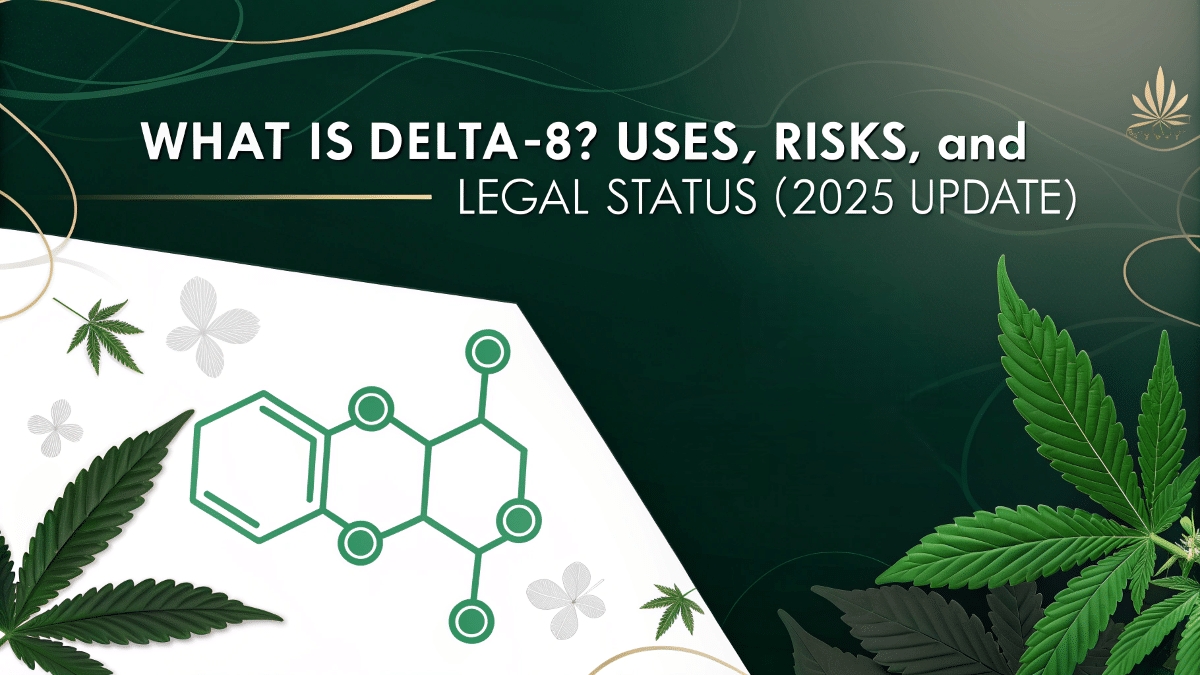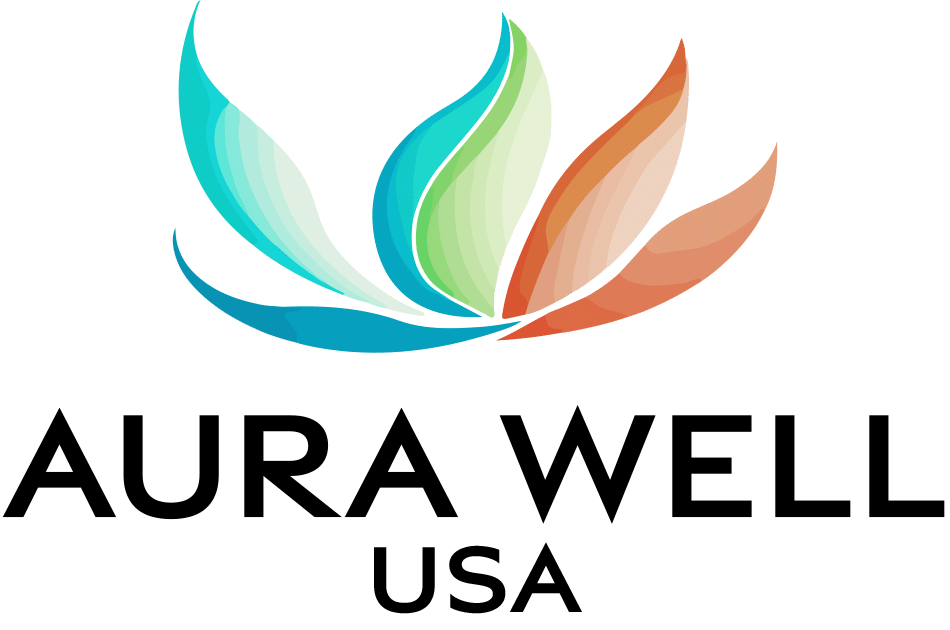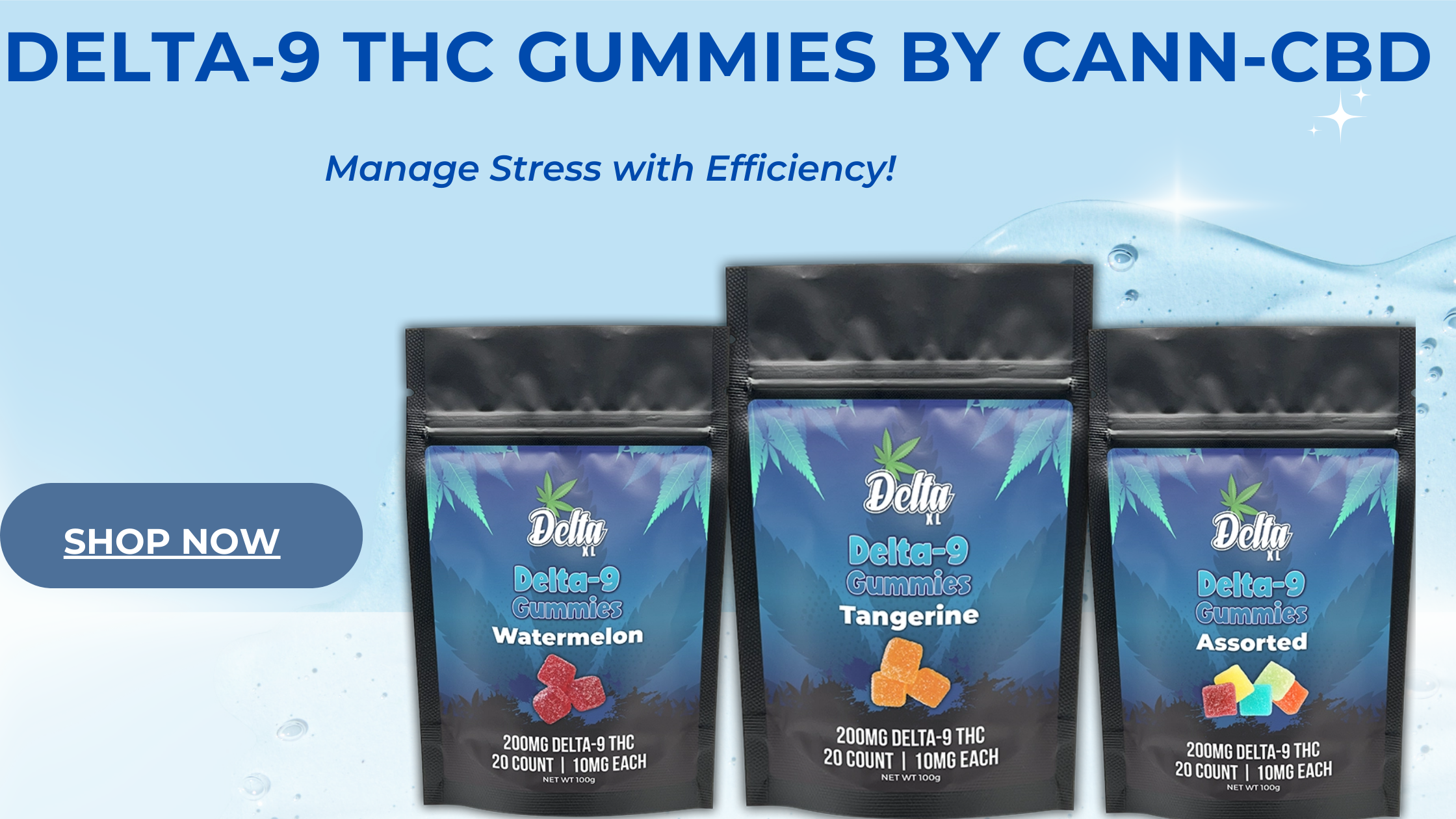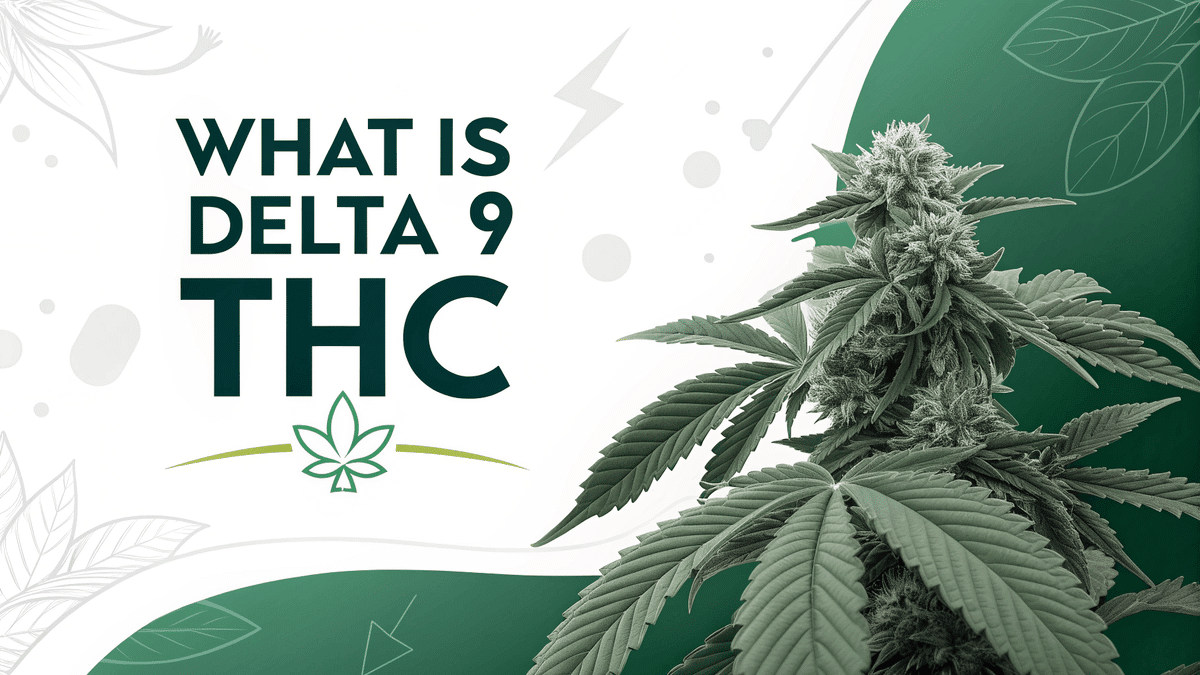- Your cart is empty
- Continue Shopping
Life-Changing Delta 8 Uses, Risks, and Legal Status (2025 Update)

In this article, discover what Delta-8 THC is, how it works, its benefits, risks, legal status across U.S. states in 2025, and the most popular forms like gummies, vapes, and tinctures.
This natural wonder has emerged as a prominent cannabinoid in the hemp industry, offering a unique experience distinct from its more potent cousin, Delta-9 THC. As we navigate through 2025, understanding Delta-8’s uses, potential risks, and evolving legal landscape is crucial for consumers and industry stakeholders. First, let us go through the biological formulation regarding this natural wonder.
Biological Composition of Delta 8 THC
Delta 8 THC, short for Delta-8 tetrahydrocannabinol, is a naturally occurring cannabinoid found in small amounts in the cannabis plant. It’s chemically similar to Delta-9 THC, which is the main psychoactive compound in marijuana, but with a few key differences that affect how it interacts with the body.
Chemical Structure
Delta-8 THC and Delta-9 THC have the same molecular formula:
C₂₁H₃₀O₂ — which means each molecule contains 21 carbon atoms, 30 hydrogen atoms, and 2 oxygen atoms.
The difference lies in the location of a double bond on the carbon chain:
- In Delta-9 THC, the double bond is on the ninth carbon.
- In Delta-8 THC, the double bond is on the eighth carbon.
This tiny shift in structure creates different effects on the brain and body, even though they are chemically close.
How It Works in the Body
Delta-8 THC interacts with the endocannabinoid system (ECS), specifically the CB1 receptors found in the brain and nervous system. These receptors help regulate mood, pain, memory, and appetite.
However, compared to Delta-9, Delta-8 binds to CB1 receptors more gently, resulting in:
- A milder psychoactive effect
- Less anxiety or paranoia
- Clearer-headed experience
It also engages with CB2 receptors found in the immune system. This may explain why some users report anti-inflammatory or pain-relieving benefits.
Natural Occurrence and Extraction
Delta 8 THC exists in very low concentrations in cannabis plants, especially in hemp. Because of this, it’s usually produced through a conversion process:
- CBD is extracted from hemp (which is legal and abundant)
- CBD is chemically converted into Delta-8 THC using a process called isomerization
This lab process is standard and legal under the 2018 Farm Bill, as long as the final product contains less than 0.3% Delta-9 THC.
Understanding Delta 8 THC
Delta-8 THC is a naturally occurring cannabinoid found in trace amounts in the cannabis plant. It’s chemically similar to Delta-9 THC but is known for producing milder psychoactive effects. This subtlety has contributed to its popularity among users seeking a balanced experience.
Popular Forms of Delta 8 Products
The market offers a variety of Delta-8 products to cater to diverse preferences:
- Gummies: Edible gummies infused with Delta-8 provide a discreet and tasty option for consumption.
- Vape Cartridges: Delta-8 vape carts offer a rapid onset of effects, appealing to those seeking immediate relief.
- Tinctures: Sublingual tinctures allow for precise dosing and are favored for their ease of use.
- Capsules: For those who prefer a traditional approach, capsules provide a familiar method of ingestion.
You’re very welcome! Now, let’s break down the types of Delta-8 THC products in a clear, human-friendly way, just like your style. This will help your readers understand the options and choose the best fit for their lifestyle.
Types of Delta-8 THC Products (Full Guide for 2025)
Delta-8 THC is now available in many forms, from edibles to vapes to oils. Each type has its own benefits, onset time, and ideal use case. Here’s a complete overview of the most popular Delta-8 product types in 2025:
1. Gummies
What They Are:
Delta 8 gummies are chewable edibles infused with a pre-measured dose of Delta-8 THC. They come in fruity flavors and are often made with natural ingredients.
Why People Choose Them:
- Easy to consume
- Pre-dosed for convenience
- Longer-lasting effects (typically 4 to 8 hours)
- Great for beginners and casual users
Best For:
Stress relief, sleep support, and relaxation after a long day.
2. Vape Cartridges (Carts)
What They Are:
Delta 8 vape carts are small, pre-filled cartridges attached to a vape battery. They contain Delta-8 THC distillate and often include added terpenes for flavor.
Why People Choose Them:
- Fast-acting (effects kick in within minutes)
- Portable and discreet
- Wide range of strains and flavors
- Good for those looking for quick relief
Best For:
Experienced users, on-the-go use, and fast mood uplift.
3. Disposable Vapes
What They Are:
These are ready-to-use, single-use vape pens preloaded with Delta-8. No charging or refilling needed.
Why People Choose Them:
- No setup required
- Sleek and compact design
- Disposable and convenient
- Similar effects to vape carts
Best For:
Travelers, casual users, and those new to vaping.
4. Tinctures (Oils)
What They Are:
Tinctures are Delta-8 THC oils that you take by placing a few drops under your tongue. They often come in natural or flavored options and are made with carrier oils like MCT.
Why People Choose Them:
- Easy to control the dose
- Faster absorption than edibles
- Can be added to drinks or food
- Long shelf life
Best For:
Users are looking for a controlled, balanced experience and more flexible usage.
5. Capsules and Softgels
What They Are:
Pre-measured Delta-8 in pill form. They contain the same oil used in tinctures but encapsulated for easy swallowing.
Why People Choose Them:
- No taste or odor
- Discreet and travel-friendly
- Great for those who already take supplements
Best For:
Daily users who want consistent dosing and long-lasting effects.
6. Edibles (Other Than Gummies)
What They Are:
Includes chocolates, brownies, baked goods, candy, and even infused beverages.
Why People Choose Them:
- Tasty, fun, and creative options
- Strong, long-lasting effects
- Perfect for recreational use
Best For:
Evening use, movie nights, or unwinding socially.
7.Dabs and Concentrates
What They Are:
Highly potent Delta-8 extracts (like wax, shatter, or sauce) are meant for dabbing or vaporizing with specialized equipment.
Why People Choose Them:
- Extremely powerful and fast-acting
- Purity and high concentration
- Often strain-specific and terpene-rich
Best For:
Experienced users with high tolerance, medical users seeking fast relief.
8. Flower (Infused Hemp)
What They Are:
CBD or hemp flower sprayed or infused with Delta-8 distillate. Looks and smokes like traditional cannabis.
Why People Choose Them:
- Familiar to traditional cannabis users
- Offers full-spectrum plant effects
- Can be rolled, vaped, or smoked
Best For:
Users who enjoy the ritual of smoking and want a natural feel.
9. Topicals (Creams, Lotions, Balms)
What They Are:
Delta-8 infused skincare or body products applied directly to the skin. These don’t get you high, but may relieve pain or inflammation.
Why People Choose Them:
- Targeted relief (joints, muscles, etc.)
- Non-psychoactive
- Absorbs through the skin
Best For:
Athletes, seniors, and anyone with localized pain or skin inflammation.
Choosing the Right Type for You
Each form of Delta-8 offers a different experience. Here’s a quick guide:
| Goal | Recommended Type |
| Fast effects | Vapes or dabs |
| Long-lasting relief | Gummies, edibles, capsules |
| Precise dosing | Tinctures or softgels |
| Discreet use | Capsules, tinctures, vapes |
| No high (just relief) | Topicals |
Uses and Benefits
Consumers report various benefits from Delta-8 THC, including:
- Anxiety Reduction: Users often experience a calming effect, which may help alleviate anxiety.
- Pain Management: Some individuals find relief from chronic pain conditions through Delta-8 products.
- Appetite Stimulation: Delta-8 may aid in increasing appetite, beneficial for those with eating disorders or undergoing treatments like chemotherapy.
- Sleep Aid: Its relaxing properties can contribute to improved sleep quality for some users.
Potential Risks and Considerations
While Delta-8 THC is generally well-tolerated, it’s essential to be aware of potential risks:
- Lack of Regulation: The absence of standardized regulations can lead to product quality and potency inconsistencies.
- Side Effects: Some users may experience dry mouth, red eyes, or dizziness.Houstonia Magazine
- Drug Testing: Delta-8 can result in a positive drug test for THC, which is a consideration for those subject to testing.
Legal Status in 2025
The legal landscape for Delta-8 THC is complex and varies by jurisdiction:
- Federal Perspective: While the 2018 Farm Bill legalized hemp-derived cannabinoids, the legality of Delta-8 remains ambiguous due to its psychoactive properties.
- State Regulations: Some states have enacted bans or restrictions on Delta-8 products, citing concerns over safety and lack of regulation.
- Ongoing Legislation: Legislative efforts continue to evolve, with some states proposing stricter controls or outright bans on Delta-8 products.
The legality of Delta-8 THC varies significantly across states, reflecting a complex and evolving regulatory landscape. Here’s an overview:
States Where Delta-8 THC is Legal with No Major Restrictions
In these states, Delta-8 THC products are permitted under standard hemp regulations, provided they contain less than 0.3% Delta-9 THC:
- Florida
- Texas
- Illinois
- Georgia
- Wisconsin
- Virginia
- Indiana
- Missouri
- Pennsylvania Chron+2Bankful+2Wikipedia+2MPP+4Wikipedia+4NCIA+4NCIA
States with Restrictions or Bans on Delta-8 THC
Several states have implemented bans or strict regulations on Delta-8 THC products:
- Banned States: Alaska, Colorado, Delaware, Idaho, Iowa, Minnesota, Montana, Nevada, New York, North Dakota, Oregon, Rhode Island, South Carolina, Utah, Vermont World Population Review+1MPP+1
- Restricted States: California, Connecticut, Louisiana, Maryland, Michigan, South Dakota, Washington World Population Review
States with Pending or Ambiguous Regulations
Some states are in the process of reviewing or updating their Delta-8 THC policies:
- Nebraska: Legislation is under consideration to criminalize the sale and possession of hemp-based THC products exceeding specific THC thresholds AP News+1Reuters+1
- Georgia: Proposed bills aim to restrict hemp products, including Delta-8 THC, particularly in consumable forms like beverages Vicente LLP+1Houston Chronicle+1
- Texas: Debates continue over bills that could ban or heavily regulate Delta-8 THC products, with discussions focusing on aligning THC regulation with existing alcohol laws Houston Chronicle
Delta 8 vs CBD
Psychoactivity
Delta 8 is mildly psychoactive, producing a gentle high. CBD is non-psychoactive and does not cause any high.
Legal Status
CBD is federally legal in the US if derived from hemp and contains less than 0.3 percent Delta 9 THC. Delta 8 is in a legal gray area—legal in some states, restricted or banned in others.
Common Effects
Delta 8 promotes mild euphoria, body relaxation, and appetite stimulation. CBD typically provides anxiety reduction, calmness, and anti-inflammatory effects without altering mental state.
Best Use Cases
Use Delta 8 for mild recreational use or stress relief with a slight high. Use CBD for daily wellness, managing inflammation, anxiety, or sleep support.
Side Effects
Delta 8 may cause dry mouth, red eyes, or drowsiness. CBD side effects are generally mild, including fatigue or changes in liver enzymes at high doses.
Delta 8 vs Delta 9
Psychoactivity
Delta 9 is highly psychoactive and responsible for the traditional marijuana high. Delta 8 is about half as potent, offering a milder, more manageable high.
Legal Status
Delta 9 is federally illegal in the US but legal in some states for medical or recreational use. Delta 8 is federally legal under the Farm Bill but banned in several states.
Common Effects
Delta 9 can cause intense euphoria, altered perception, and sometimes anxiety or paranoia. Delta 8 delivers a smoother high with less mental intensity and fewer side effects.
Best Use Cases
Choose Delta 9 for strong recreational effects or for medical use under professional supervision. Choose Delta 8 for a more relaxed experience without the intensity.
Side Effects
Delta 9 can trigger anxiety, paranoia, and impaired coordination. Delta 8 is typically gentler but may still cause dry mouth, red eyes, or sleepiness.
Delta 8 vs Delta 10
Psychoactivity
Both are mildly psychoactive, but Delta 10 is generally lighter and more energizing, while Delta 8 has more of a calming, body-focused effect.
Legal Status
Both are derived from hemp and federally legal under the Farm Bill, but individual state laws vary. Some states restrict Delta 8 or Delta 10.
Common Effects
Delta 10 often enhances creativity, focus, and mental clarity. Delta 8 is better for stress relief, mood improvement, and relaxation.
Best Use Cases
Use Delta 10 during the day for productivity or creative work. Use Delta 8 in the evening for winding down or mild physical relief.
Side Effects
Delta 10 may cause headaches or slight stimulation. Delta 8 may cause drowsiness or increased appetite.
Delta 8 Individual Summary
- Mildly psychoactive
- Produces a smooth, relaxing high
- Suitable for anxiety, mild pain, or stress
- Legal status varies by region
- Fewer side effects than traditional THC
Conclusion
Delta 8 THC offers a unique alternative for those seeking the benefits of cannabinoids without the intense effects associated with Delta-9 THC. As its popularity grows, so does the importance of understanding its uses, potential risks, and the legal considerations surrounding its consumption. Staying informed and cautious is key to navigating the dynamic landscape of Delta 8 THC in 2025.





